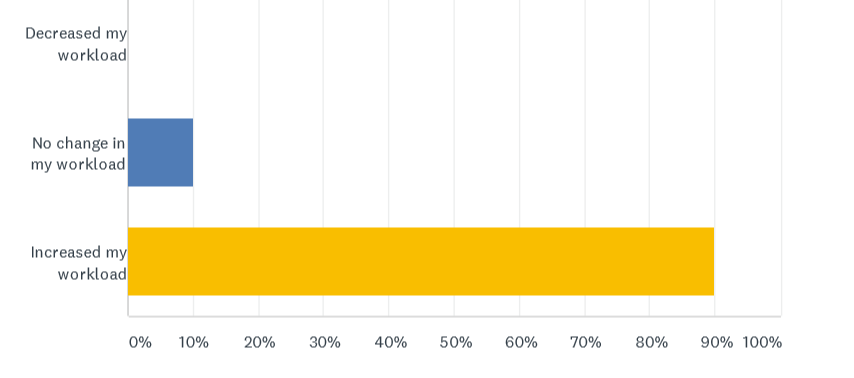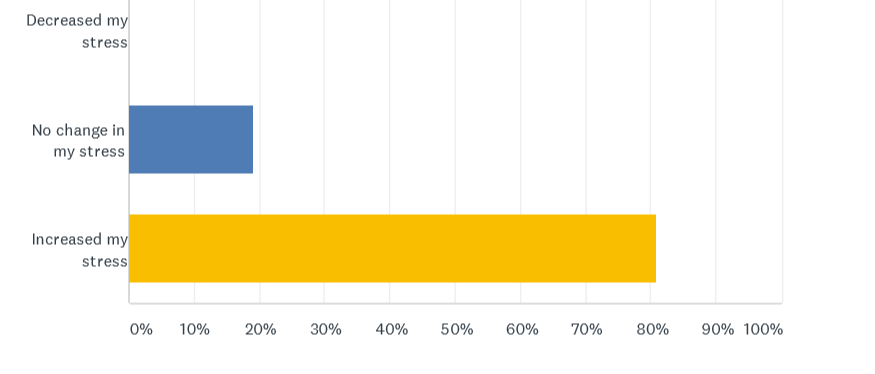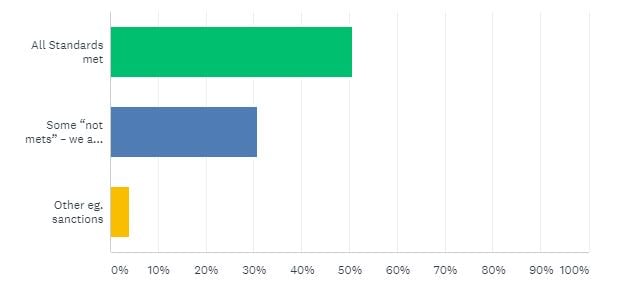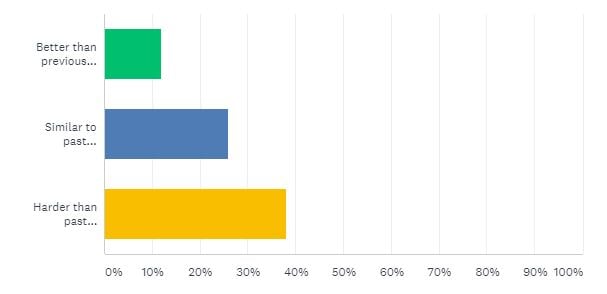With the Aged Care Quality Standards now in operation for over a year, we thought it was a good time to check in with residential aged care providers about how they’ve coped with life under the new Standards:
- have their workloads and stress-levels gone up or down?
- What processes have changed?
- What’s their experience of assessment?
- What tips do they have to offer other aged care providers?
To find out, we issued a survey to our subscribers on 30 June 2020. We will keep this survey open until COB Friday 10 July 2020 in case you haven’t had a chance to respond (you can access the survey here). Meanwhile, here are some of the preliminary results.
Key Results
- The vast majority of respondents believe the Aged Care Quality Standards have increased their workloads and stress levels.
- The vast majority of respondents have changed their systems and processes in response to the Standards.
- Respondents are generally moving towards more flexible, simpler systems that focus on improved communication and consultation, training, risk management and review.
- While some respondents believe the Standards have brought a positive shift towards a more consumer-centred culture, many more believe the Standards have merely increased paperwork without improving care.
- About 58% of respondents have received a Commission visit in the last year. About half of these visits resulted in all Standards met. About 30% resulted in some “not-mets”; the remainder resulted in other sanctions.
- About 33% of respondents had undertaken accreditation under the new Standards. Of these, 38% found the experience harder than before and 26% found it about the same as before.
Who Responded to the Survey?
The survey was anonymous, and we have so far had just over 100 responses. The vast majority of respondents described themselves as managers working in residential aged care. Most respondents work in facilities with fewer than 100 beds, although there were a significant number of respondents who work in larger homes.
On a scale of 1-10 (with 1 being easy and 10 being very disruptive), how challenging has it been to comply with The Standards in the first year for your residential aged care facility?
The average rating here was 7.
How has complying with The Standards affected your workload?

As you can see here, the vast majority of respondents said that complying with the Standards had increased their workload. Several respondents made comments emphasising the cost of managing this extra workload, with one saying, “Has increased the work load 4 fold - have had to use so many more staff and resources to implement these in a situation where the facility is already struggling with finances”; another said, “additional reporting and documentation - once again that’s time away from our core business of care of the frail elderly.”
How has complying with The Standards affected your level of stress?

As with increased workload, the vast majority of respondents reported increased stress. Comments suggested that increased stress was linked to increased workload, increased expectations and the challenge of meeting Commission assessments, particularly unannounced assessments.
Some comments also revealed the impact that stress is having on staff retention, with one respondent saying, “I have just taken a step out to a lower paid support role as I worry about not being able to meet the standards. I was a very well-regarded person-centred facility manager before the role became completely unmanageable.”
Have you had to change your system or process for managing policies and procedures due to the new Standards?
About 87% of respondents answered yes to this question. When asked “What changes have you made?” many respondents indicated that the changes were extensive and covered things such as improving communication, moving systems online, improving self-assessments and shifting the focus towards person-centred care. Many said they had to draft entirely new policies and procedures. One respondent answered simply: “Everything.”
Have you had to change your system or process for managing staff training due to the new Standards?
About 78% of respondents answered yes to this question. When asked “What changes have you made?” many respondents said that they had increased the amount of staff training. Some commented that they had started doing some training online, and some said they had changed their training to map it more closely to the Standards.
Have you had to change your system or process for collecting and reporting on data due to the new Standards?
About 80% of respondents answered yes to this question. When asked “What changes have you made?” many respondents said they had increased their use of surveys and audits. Many also commented on the challenges this created. “Enormous reporting taking away from care” said one respondent. Another said, “Spend most of the month collecting data and no time to work on improvements.”
What new or additional systems or changes have you had to put in place to meet The Standards?
Respondents mentioned many different things in answer to this question. The main themes were that changes were extensive, had been difficult and not always worth the effort. Answers included:
- “Training, analytics, clinical indicators, forms for evidence, accreditation readiness, scheduling, feedback – all of which was much easier before.”
- “Increased RN workloads to the point no - one wants to be involved.”
- “A ridiculous spreadsheet on all psychotropics and one designed by the commission – clearly by people who have not been trained appropriately nor worked in management on the ground.”
What new or additional systems are you looking to put in place over the next year to help you meet The Standards?
The answers to this question revealed that respondents are generally moving towards more flexible, simpler systems that focus on improved communication and consultation, training, risk management and review.
Many answers also revealed underlying issues. These included scepticism about the Standards, with one respondent saying the only changes they were making were to, “Make more useless policies about how to cover your butt.” There was also anxiety about uncertainty: “More education on the agencies expectations!” said one respondent.
Have you had a Commission Visit?
Yes – 58%
No – 42%
If Yes, What was the outcome of your Commission Visit?

Have you undertaken re-accreditation in line with The Standards?
Yes – 33%
No – 67%
If Yes, What was your experience like?

Do you have any tips to offer other residential aged care facility leaders?
Common themes here were: look after yourself and your staff and try to keep things simple. Some comments were “high level” while others went into specific, practical detail. Many respondents also used their comments to remind their colleagues of the fundamental value of aged care. One respondent said:
“Stay sane in this insane environment that we work in however you can and don't forget that we try our best every day, despite what you read or see in the media. In addition, don't take it lying down, if you are passionate about the sector, have a voice speak up against all the negativity we see coming our way these days. Be proud of your staff and your work.”
Have Your Say and the Full Report
Thank you to everyone who has responded to the survey so far – your input will inform future ACE articles, helping to keep them relevant and grounded in the real experiences of residential aged care providers.
To those who haven’t yet had a chance to complete the survey, we are keen to hear from you. The survey is completely anonymous, and you can access it here.
This article provides preliminary results for a few of the survey questions. The full report will cover final results for all questions mentioned in this article, in greater detail, plus:
- Aged care providers’ main challenges and concerns
- Responses to COVID-19
- More tips and comments
The full report will be available in mid-July.








